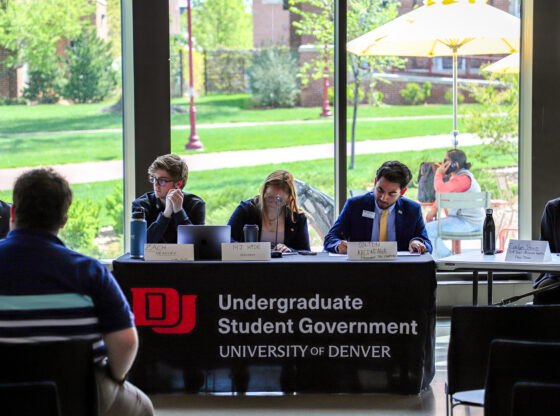Mayor Michael Hancock spoke to a group of over 70 students, faculty, staff and community members about the importance of global thinking and awareness last Thursday in Cherrington Hall.
The event was part of a Religion and Violence Series sponsored by the Korbel School of International Studies and the Iliff School of Theology. It also included a short lecture by Professor Willie Jennings from Duke Divinity School and a panel discussion including Korbel professor Alan Gilbert, psychology professor Edward Antonio and psychology professor Arthur Jones.
The Religion and Violence Series was started as a way to facilitate discussions about issues related to religious violence. It is aimed mainly at upper-division and graduate-level students from Iliff and Korbel, but the events are open to everyone at DU and the surrounding community. Events featuring different speakers are held quarterly.
Hancock emphasized the need for globalization to happen in Denver, and for the city to become a gateway to the rest of the world.
“My vision for this city is that we are a global city,” said Hancock.
 The mayor cited the new nonstop flights out of Denver International Airport (DIA) to places like Reykjavik, Iceland and Tokyo, Japan as ways of accomplishing this goal. He said more efforts like this will be coming in the future. He also talked about the connection between religion and violence and the importance of avoiding the glorification of violence through religion.
The mayor cited the new nonstop flights out of Denver International Airport (DIA) to places like Reykjavik, Iceland and Tokyo, Japan as ways of accomplishing this goal. He said more efforts like this will be coming in the future. He also talked about the connection between religion and violence and the importance of avoiding the glorification of violence through religion.
He said one way this glorification can be avoided is by training religious leaders how to perform funerals for gang members who have died from gang violence without unintentionally portraying the violence as heroic. Hancock cited this type of training as an important part of preventing younger people from wanting to become part of violent communities such as gangs.
The mayor stayed for the lecture by Professor Jennings, which aligned with the theme of black history month.
Jennings discussed the emergence of racial identity in conjunction with the development of commerce and private property in relation to the slave trade. He described the slave ship as “the first cosmopolitan space,” where international groups of people were united behind one goal and a commercial entity was bought and sold on a large scale. He also pointed out that anyone who was not bought and sold was considered white at this time, which further developed the idea of racial divisions and identity.
Jennings also said there is a strong connection between the Christian faith and the emergence of racial identity because of the way Christianity categorizes people into different groups. Jennings said people have traditionally been seen as “either Christians or potential Christians” in the eyes of Christianity. This duel thinking can also be applied to racial identity according to Jennings. He told the audience that he was attempting “to give a different account of where race came from,” and ended by posing three questions to the audience:
“First, how do we relate to one another, and why do we relate to one another? Second, To whom do we belong? Finally, Who do we want to be?” said Jennings.











